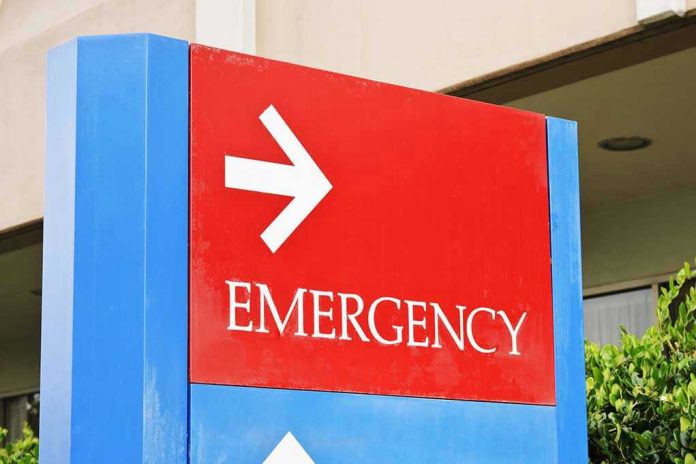
As record-breaking heatwaves sweep the nation, a top cardiologist warns that extreme summer temperatures now pose a deadly threat to Americans’ heart health—and many at-risk individuals remain dangerously unaware.
Story Snapshot
- Dr. Chauncey Crandall, a nationally recognized heart specialist, cautions that the summer of 2025’s extreme heat is triggering spikes in heart attacks and strokes.
- Vulnerable groups—including seniors and those with pre-existing heart conditions—face the highest risk during ongoing heatwaves.
- Hospitals are reporting a surge in emergency cases tied to heat-related cardiac events, straining healthcare resources across multiple regions.
- Dr. Crandall urges Americans to take concrete preventive steps and calls for greater public awareness amid the crisis.
Renowned Cardiologist Issues Urgent Warning Amid Historic Heatwaves
On August 8, 2025, Dr. Chauncey Crandall, a Yale-trained, board-certified cardiologist and chief of a major cardiovascular program, appeared on Newsmax to sound the alarm: extreme summer heat is now causing a marked increase in cardiac emergencies. Dr. Crandall emphasized that high temperatures significantly raise the risk of heart attacks and strokes, particularly among the elderly, those with chronic heart disease, and outdoor workers. This urgent warning comes as the United States faces some of the hottest summer conditions in decades, with public health officials issuing advisories nationwide.
Decades of medical evidence show a direct relationship between sustained heat and cardiovascular events. Dr. Crandall’s dual role as a practicing physician and author of widely referenced patient guides lends authority to his concerns. He pointed out that recent hospital data confirm a surge in heat-related admissions for heart attacks, strokes, and arrhythmias. These trends are especially pronounced in regions hit hardest by the current heatwave, where emergency rooms are stretched to capacity. Dr. Crandall’s reputation for clear, actionable advice has made his preventive recommendations particularly impactful during this crisis.
Extreme Heat Exposes Vulnerabilities in At-Risk Populations
Cardiac patients, seniors, and low-income Americans unable to access proper cooling are disproportionately affected by the ongoing crisis. Historical data from previous heatwaves—such as those in Europe (2003) and the U.S. (2021)—underscore the danger: spikes in cardiovascular mortality have followed prolonged periods of high temperatures. The summer of 2025’s record heat is straining healthcare systems, with hospitals reporting a rise in emergency visits and heightened mortality among vulnerable populations. Public health campaigns now stress the importance of hydration, limited outdoor activity, and rapid recognition of heart distress symptoms.
Dr. Crandall’s advice aligns with the broader medical consensus: heat stress can destabilize heart function, leading to life-threatening complications. Peer-reviewed studies and medical associations confirm that those with pre-existing conditions must take extra precautions. Experts recommend community-level interventions—such as establishing cooling centers—to protect those without adequate access to air conditioning. These measures are now more urgent as climate trends point toward increasingly frequent and severe heatwaves in coming years.
Prevention, Public Awareness, and the Path Forward
In response to the mounting crisis, Dr. Crandall has repeatedly highlighted practical, common-sense steps for Americans to safeguard their health. These include staying hydrated, avoiding strenuous activity during peak heat hours, and monitoring for warning signs such as chest pain, dizziness, or shortness of breath. Hospitals and local agencies are ramping up outreach, but gaps in public awareness remain—especially in rural and underserved communities. The crisis also raises questions for policymakers, who must balance individual responsibility with systemic solutions such as infrastructure upgrades and targeted support for at-risk groups.
Dr. Crandall: Extreme heat can trigger heart attacks, strokes | Newslinehttps://t.co/JAEKm1Mer3
— ConspiracyDailyUpdat (@conspiracydup) August 9, 2025
Dr. Crandall’s nationally broadcast warnings have resonated with Americans frustrated by government overreach and bureaucratic inefficiency. His call for vigilance, personal responsibility, and community action reflects core conservative values: protecting family health, prioritizing individual liberty, and demanding accountability in public health planning. As the summer of 2025 continues to break records, Dr. Crandall’s message remains clear—Americans must stay informed, take precautions, and advocate for sensible solutions that respect both personal freedoms and the realities of a changing environment.
Sources:
Medical News Today – Dr. Chauncey Crandall Profile
Fable – Chauncey W. Crandall, Author Page
Jewish Voice – Dr. Chauncey Crandall Articles
About.me – Dr. Chauncey Crandall, MD



